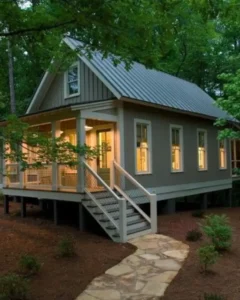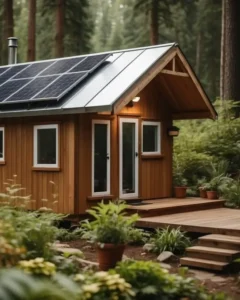Defining Small Houses
Small houses, embracing the idea of living simply and efficiently, focus on the essentials rather than excess space. The types of small houses are significantly less in square footage than the average American home. Their appeal lies in offering a comfortable living space while minimizing maintenance costs, environmental impact, and the general overhead associated with larger homes.
Characteristics of Small Houses:
- Compact Size: Generally under 1,000 square feet.
- Efficient Space Usage: Every inch is designed to be functional.
- Affordability: Less expensive than larger homes due to reduced material and land costs.
- Mobility: Some, like tiny houses on wheels and converted buses, offer the option to relocate easily.
Common Types of Small Houses:
- Tiny Houses: Freestanding homes typically under 400 square feet.
- Cottages: Charming and often rural homes that embody coziness.
- Bungalows: Single-story houses with a modest footprint.
- Cabins: Rustic shelters, often located in wilderness settings.
- Mobile Homes: flexible living solution on wheels
Inspirations

Tiny Houses
Tiny houses are compact, efficient homes typically ranging from 100 to 400 square feet. Their design often emphasizes eco-friendly materials and strives to maximize space through innovative layouts. For instance, some tiny houses are built to mimic Scandinavian minimalist designs, offering a sleek and functional living area in a small footprint.
Tiny House with Wood Elements

Tiny House Scandinavian Style

Modern Tiny House

Cottages
Cottages evoke a picture of quaint, cozy homes often associated with rural settings or holiday retreats. They usually feature a one-story design with charming architectural details like gable roofs, bay windows, and wood siding. These small dwellings are perfect for those seeking a comfortable and picturesque living space.
Wood Cottage

Open-Concept Cottage

Rustic Lakeside Cottage

Mobile Homes
Mobile homes, including RVs and tiny houses on wheels, provide a flexible living solution for those who prefer a nomadic lifestyle or do not wish to commit to a permanent foundation. Models like teardrop trailers and Class C motorhomes are popular among tiny living enthusiasts for their versatility and mobility.
Mobile Home Wood and Metal

Rustic Elegance Mobile Home

Mobile Home made out of Wood

Bungalows
Bungalows are traditionally one-story houses with a practical layout that often includes a front porch or veranda. With their low-pitched roofs and broad, projecting eaves, bungalows are known for their simple and spacious design that sets them apart in the domain of small houses.
Classic Bungalow

Bungalow with open Veranda

Noble Bungalow

Cabins
Cabins are small, rustic dwellings commonly found in woodland or mountainous areas. They typically feature robust construction with natural materials like logs or wood siding, offering a simple but sturdy shelter. Cabins are ideal for those seeking a getaway in tune with nature or a lifestyle centered on outdoor activities.
Small Metal Cabin

Double Cabin in the Woods

Wood and Stone Cabin

Building Materials
When constructing a small house, the choice of materials significantly affects sustainability, cost, and the overall aesthetic. Builders often consider the environmental impact, resource availability, and potential for incorporating recycled pieces into their designs.
Sustainable Materials

Sustainable building materials typically have a lower environmental impact, both in terms of their production and the lifetime energy costs of the small house. For instance, the use of bamboo is prevalent due to its rapid growth rate and durability. Similarly, straw bales are recognized for their excellent insulation properties, making them a popular choice for those looking to reduce energy consumption.
4.5 ⭐️ Rating on Amazon
What customers say:
✅ "I have two of these - a small one for a plant stand, and a taller one for an end table. It is perfect in my farmhouse themed living room. It is sturdy, easy to clear and a nice conversation piece."
✅ "I wasnt sure about this purchase but was delightfully surprised ~ this table is the perfect hight, stable & beautiful!! Easy to assemble and a great value for the money!!"
Recycled Elements
Recycled elements lend a unique character to tiny homes while also diverting materials from landfills. Reclaimed wood can be utilized for flooring or wall paneling, providing a rustic charm and story to the space. Incorporating repurposed windows and doors is another approach to minimize waste and add personality.
Local Sourcing

Local sourcing of materials supports the community and reduces the carbon footprint due to shorter transportation distances. Builders may opt for locally sourced stone for foundations or exterior walls. They often prioritize materials such as locally milled lumber or regional natural stone, which can reduce transportation costs and support local economies.
If you prefer to get inspiration from a video, I recommend this one:
What are the characteristics of a small house?
Small houses typically range under 1,000 square feet, feature multi-functional furniture, utilize colors and corners cleverly, and often include combined living spaces.
What is the smallest type of house?
The smallest type of house is the micro home, which can be as tiny as living spaces under 100 square feet.
If you liked this blog article about the topic “Types of small houses”, don’t forget to leave us a comment down below to tell us about your experience.
Not enough inspiration yet?
Feel free to also check out our other Articles from the category “Tiny House“ and don’t forget to follow us on Pinterest.




